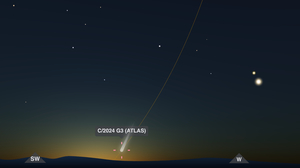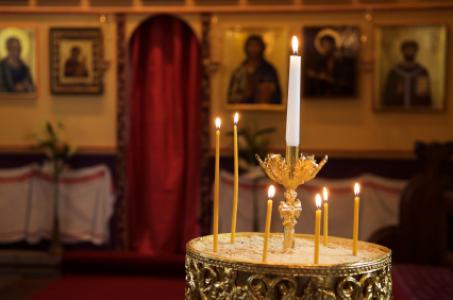
Best Comet of 2025?
C/2024 G3 (ATLAS) has already become very faintly visible to the naked eye for observers in the Southern Hemisphere.
Many Jewish communities in Australia observe the first day of Hanukkah, which marks the start of Hanukkah, also known as Chanukah or Festival of Lights. Hanukkah is an eight-day Jewish observance that remembers the Jewish people's struggle for religious freedom.
First Day of Hanukkah is not a public holiday. Businesses have normal opening hours.

Hanukkah is a time for gift-giving.
©iStockphoto.com/MarkCoffeyPhoto
Many Jewish Australians start observing Hanukkah on the evening before on the first day of Hanukkah, as many Jewish observances begin at sunset on the day before. The first day of Hanukkah is marked as the 25th day of the month of Kislev in the Jewish calendar. The Hanukkah period lasts for 8 days up until the second day of the month of Tevet.
Hanukkah (or Chanukah) often starts with special blessings at sunset the day before the 25th of Kislev. Many Jewish people light the hanukiah (or chanukkiyah), which is a type of candelabrum. Some state governments, such as the New South Wales government, have issued public statements to people celebrating Hanukkah, reminding them to be aware of fire hazards associated with Hanukkah, particularly with regard to using oil and lighting candles.
Hanukkah is a festive period for Jewish communities throughout Australia. Events involving meals, socializing, and games are held in venues such as parks and beaches. Meals that are offered during these events are often foods fried in olive oil, such as potato cakes, and different fried breads. It is also a time for gift-giving so some people order gift baskets to give to others. Hanukkah card games, board games and books are sold in Australia. A toy known as the dreidel is widely popular among both children and adults during Hanukkah.
The first day of Hanukkah is not a nationwide public holiday in Australia. Many Jewish schools have their school vacation fall around the same time of Hanukkah.
Hanukkah commemorates the Jewish people’s successful rebellion against the Syrians in the Maccabean War in 162 BCE. A ritual cleansing and re-dedication of the Temple occurred after the Jewish people’s victory. It is believed that there was only enough consecrated oil to keep the lamp burning for one day but the small bottle of oil miraculously lasted for eight days. Hanukkah, also known as Chanukah, is referred as the Feast of Lights or Festival of Lights for this reason.
Moreover, the survival of Judaism over the many years is also celebrated during this period. The last day of Hanukkah, which marks the end of Hanukkah, falls on the eighth day of this period.
The dreidel is a toy that is popular during the Hanukkah celebrations. It is a spinning top with a different Hebrew letter inscribed in each of its four sides – the four letters form an acronym meaning “a great miracle happened here”. The hanukiah (or chanukkiyah) is a type of candelabrum that holds eight candles to commemorate the eight days that the oil burned and a ninth candle that sits apart, known as the shamash, or servant candle that lights the others. One candle is lit on the first night, another on the second, and so forth until all candles are lit on the last night.
In the Jewish diaspora—Jewish communities outside of Israel—an extra day is usually added to religious observances, with the exception of Yom Kippur, which lasts only one day worldwide, and Rosh Hashana, which is celebrated over two days in both Israel and the diaspora.
This custom has its roots in ancient times when the beginning of the months in the Jewish calendar still relied on the sighting of the crescent Moon following a New Moon.
The beginning of a new month was determined by the Sanhedrin, the supreme court of ancient Israel in Jerusalem. Once the date was published, messengers were dispatched to spread the news among Jews living abroad. Since this process took some time, it was decreed that Jews outside of ancient Israel were to observe every holiday for 2 days to make sure that the rules and customs applicable to each holiday were observed on the proper date. This rule is still observed today.
Note: Jewish holidays begin at sundown the day before the date specified for the holiday.
| Year | Weekday | Date | Name | Holiday Type |
|---|---|---|---|---|
| 2020 | 金曜日 | 12月11日 (金) | First Day of Hanukkah | Jewish holiday |
| 2021 | 月曜日 | 11月29日 (月) | First Day of Hanukkah | Jewish holiday |
| 2022 | 月曜日 | 12月19日 (月) | First Day of Hanukkah | Jewish holiday |
| 2023 | 金曜日 | 12月8日 (金) | First Day of Hanukkah | Jewish holiday |
| 2024 | 木曜日 | 12月26日 (木) | First Day of Hanukkah | Jewish holiday |
| 2025 | 月曜日 | 12月15日 (月) | First Day of Hanukkah | Jewish holiday |
| 2026 | 土曜日 | 12月5日 (土) | First Day of Hanukkah | Jewish holiday |
| 2027 | 土曜日 | 12月25日 (土) | First Day of Hanukkah | Jewish holiday |
| 2028 | 水曜日 | 12月13日 (水) | First Day of Hanukkah | Jewish holiday |
| 2029 | 日曜日 | 12月2日 (日) | First Day of Hanukkah | Jewish holiday |
| 2030 | 土曜日 | 12月21日 (土) | First Day of Hanukkah | Jewish holiday |
While we diligently research and update our holiday dates, some of the information in the table above may be preliminary. If you find an error, please let us know.

C/2024 G3 (ATLAS) has already become very faintly visible to the naked eye for observers in the Southern Hemisphere.

The last day of Hanukkah marks the end of a festive Jewish occasion, known as Hanukkah or Chanukah.

Many Orthodox Christian churches in countries such as Australia celebrate New Year’s Day on January 14 in the Gregorian calendar.

Australia Day is the Australian national day. It is celebrated on January 26 each year.